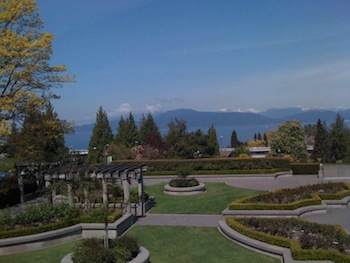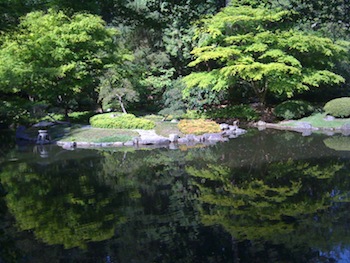|
||||||||||
|
NEW SCHOLARSHIPChinese Values and Universal Norms 中国价值与普世规范国际学术研讨会The Institute of Asian Research
University of British Columbia
22-24 September 2011A conference report by Timothy Cheek University of British Columbia
The gathering described in the following report was, to an extent, a further attempt to discuss and expand on issues raised by Tim Cheek, Gloria Davies and Geremie R Barmé at an August 2007 conference in Melbourne organised around a joint document entitled 'Chinese Visions: A Provocation'. A number of colleagues who participated in the 2007 discussions were also present in Vancouver in September 2011.—The Editor The internationalization of scholarship and of public debates in recent decades has occasioned the rise a significant new round of inter-cultural discussions related to universal norms and values. Yet there are clear differences in how these norms are understood and treated across nations/cultures and in different academic environments.  Fig.1 University of British Columbia. (Photograph: GRB) The rise of a more strident strain of nationalistic language and an open rejection of universal values both in official Chinese circles and in that country's guided media has, in recent times, reached a point of serious concern for scholars and critical intellectuals, be they inside or outside the People's Republic. Meeting in Vancouver in September 2011, scholars from three universities collaborated in a conference to investigate the intellectual, cultural, social, political and legal aspects of these parallel/intertwined/related phenomena in the context of a 'Rising China'. Our approach has been scholarly and academic, but our concerns extend to our individual roles as citizens and professionals in the public arena. Rather than rehearsing the basic facts of the case, the conference sought to bring together overlapping but distinct communities whose work addresses how we should best understand the issue of 'Chinese values' (Zhongguo jiazhi 中国价值) and 'universal norms' (variously rendered as pushi guifan 普遍规范, pushi jiazhi 'universal values', or pushi wenming 普世文明 'universal civilization'). While these formulations draw from the Sinophone casting of the core concepts under consideration, and some scholars were concerned about salient differences, the paired English and Chinese terms served as a starting point that the organizers considered were the most common terms employed in effective political speech in both the Sinophone and the Anglophone worlds. The conference was a further step in the academic cooperation between the Institute of Asian Research (IAR), University of British Columbia and the Si-Mian Institute for Advanced Studies in the Humanities (Huadong shifan daxue Simian renwen gaodeng yanjiuyuan 华东师范大学思勉人文高等研究院) at East China Normal University, Shanghai, and the Australian Centre on China and the World (CIW, Zhonghua quanqiu yanjiu zhongxin 中华全球研究中心) at The Australian National University which builds on a series of workshops over recent years (see the Editor's note above). Timothy Cheek at the IAR and Xu Jilin 许纪霖 at Si-Mian took the lead in organizing this event and the IAR generously provided major support for this event, along with the MCRI project, the Asia Pacific Dispute Resolution Program, directed by Pitman Potter. Participants included colleagues from each university, with additional colleagues from UC Berkeley, University of Montreal, and National University of Singapore. The papers and conversations at the conference were organized around four themes, three scholarly or disciplinary circles, and two scholarly communities. Taking these in reverse order, we aimed for 50/50 participation of Chinese and non-Chinese participants, drawing Chinese scholars from ECNU, Shanghai University, Shanghai Academy of Social Sciences, and the Central Party School, Beijing, as well as colleagues of Chinese heritage working in Canada and the US. European heritage scholars came from Australia, Singapore, Canada and the US. We anticipated significant differences mostly by dint of linguistic communities, that is whether a person mostly worked in Sinophone or Anglophone (or other European language) discourse.  Fig.2 Nitobe Commemorative Garden, University of British Columbia. (Photograph: GRB) We were surprised to discover that as of 2011 disciplinary differences within academia created more barriers to communication, conversation and collaboration than did the dynamic of 'China vs. The West' (a dichotomy long-since broken down) but even compared to linguistic barriers and –phone discursive styles (that is, how arguments are generally cast in Sinophone critical discourse versus that of the Anglophone world, something traced in great detail in Gloria Davies 2007 monograph Worrying About China [Harvard University Press]). Three broad domains of academic methodology were purposely invited to the table: Sinologists working on the intellectual history of China; political scientists, political theorists and policy-oriented researchers; and, scholars working in comparative law. We were all invited each to address some aspect(s) of the four themes given below, but we discovered that despite general good will, we still found it difficult to establish a common ground for integrated discussion and future research. The general finding of the conference was thus a modest warning: interdisciplinary collaboration is hard to pursue within the framework of the current academic regime—our training and our incentives (in terms of publishing and promotion) build academic silos that discourage investing time in studying and learning the concerns of another domain. Our greatest challenge of translation was thus less between Chinese and English, though it remains a problem when trying to engage non-Sinologists, and more between academic 'dialects'. Despite these challenges, we could, at least, agree on the questions and appreciate the values of work outside our province. The four shared conference themes were: The Probelmatique: To what extent are universal norms or values (and the universal human rights in which they are grounded) open to interpretation or contestation? Do we have a clear empirical sense of the scope and range, number and types of speakers, and the significance of this variation? In China, what makes a discourse on rights subversive? What does all this mean for countries, such as Canada, who must deal with China? Academic and Critical Voices: How are scholars and public intellectuals inside and outside of China engaging with this debate? Including: historical perspectives, comparative perspectives, philosophical and theoretical analyses, social and legal commentaries, illuminating examples or case studies of the core issues. The Strategic Environment: Why is this debate important beyond the realm of intellectual history? How does and can this debate reflect and influence regional and strategic relationships? Can comparative examples from other countries and regions help make better sense of the Chinese case? We particularly invited contributions on comparative perspectives. What, for instance, can we learn from a comparison of these developments in China with the Latin American case (where a history of state corporatism, with and without charismatic leaders in the twentieth century, suggests fruitful comparisons to explore what may or may not be unique to China today)? The Language of Contestation: We particularly addressed the hoary question of how thinking and writing in the Chinese language is different from thinking in English or other languages. We seek not only to understand better what is going on around this critical debate of values and political order, but also to reflect critically on the underpinnings (or grounds) of our own knowledge and the pitfalls and challenges of inter-cultural communication (both as scholars and as citizens). Certain perspectives emerged in the conversations that address these themes. Yeh Wen-hsin (UC Berkeley) endorsed the challenge to find ways to 'speak across' disciplinary, as well as cultural-linguistic, divides, reminding the conference of the history of such efforts throughout the twentieth century. Xu Jilin (ECNU) emphasised the practical danger of the contemporary turn to nationalism in the People's Republic—that such cultural irredentism among China's intellectuals risks taking the worst aspects of Western political traditions (such as statism, authoritarianism) while rejecting the best (as in respect for rule of law and human rights). Liu Qing (ECNU) questions the validity of a conception of 'universality' that implies that Chinese thought is somehow not fully human, not universal, and mired in particularity. Equally, he questioned conceptions of Chinese tradition that reify Chinese thought; instead he proposed that we look at Chinese thought and values as culturally constructed in social life, created in a 'social imaginary'. In a parallel vein, Leigh Jenco (NUS) explored how some political conceptions from twentieth century Chinese political thought can contribute as primary theory, rather than simply as example or footnote, in general political theory. Geremie Barmé (ANU) focused on the bigger picture in which these debates about value are framed: how do we tell the China story? What are the working parts of an historical narrative that forms a meaningful sense of identity for Chinese, and for others? How do we communicate across those different communities of experience in order to enrich a broader humanity? Pitman Potter (UBC) drew from his experience in legal work in and with China, as well as his research, to focus on standards rather than norms in seeking to understand and accommodate cultural and social differences and as a way to work pragmatically to common understandings and productive policy. Despite the challenges of the topic and our respective disciplinary foci, the conference resulted in specific collaborations between different sets of two or three or four scholars from difference universities rather than a grand, overarching project. Given the complexities of 'universal values' this is perhaps a prudent way to proceed. Indeed, this conference was followed in December 2011 by another one at National University of Singapore which pursed the related theme of 'Chinese Thought as Global Social Theory' under the direction of Leigh Jenco. For any questions or for follow-up contacts regarding the Vancouver conference, or this report, please feel free to contact Tim Cheek, at: t.cheek[at]ubc.ca. |